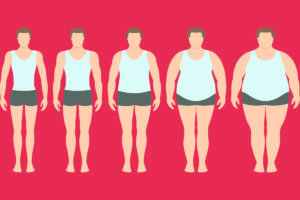Obesity
Weight Bias in the Health and Fitness Industry
In an industry that strives to help people improve health and fitness, there is still a significant amount of judgment and stigma toward people with obesity.
America’s Weight Status
By 2030, approximately half of the U.S. adult population will be obese, and a quarter will have severe obesity, based on body mass index data.
Helping Teens With Obesity
Did you know that adolescent obesity has been linked to depression, anxiety, suicidal thoughts, poor self-esteem, attention deficit hyperactivity disorder, aggressive and destructive behavior, internet addiction, binging and purging, and other severe emotional outcomes (Reinehr 2018)? Emotional issues are often attributed to bullying and weight stigma.
Top Fitness Trend in China and South America
The number-one fitness trend identified in both China and South America is the inclusion of exercise in dietary weight-loss programs, according to ACSM’s
2020 Worldwide Survey of Fitness Trends. This could be the fitness industry responding to rising rates of overweight and obesity. In North America, exercise for weight loss has declined as a trend, superseded by health and wellness coaching.
Average BMI of Americans Is Increasing
Fitness professionals have an opportunity to help more Americans who are trying to improve their health. The population’s average body mass index is increasing, even as more Americans are trying to lose weight, according to findings published in JAMA Network Open.
More Strikes Against Eating Too Much Salt
A duo of recent studies are further strengthening the case against dumping high amounts of salt into restaurant fare and packaged processed foods.
Poor Food Choices at Work Can Impact Overall Diet
Since many Americans spend half their waking hours at a job, it makes sense that the food they decide to purchase at work can have a big impact on their overall diet.
Maternal Weight and Pregnancy Complications
Encourage your pregnant clients (if cleared by their doctors) to keep working out with you. A new study shows that maintaining a healthy weight before and during pregnancy is a key factor in avoiding pregnancy complications.
Processed Food Linked to Weight Gain
Over the past several decades, fast-food and processed/packaged foods made with cheap ingredients like white flour and salt have come to dominate the American diet. While an established link between eating too much junk food and obesity has been made, there is still a need for more research to suss out the reasons why.
Can Digital Multitasking Increase Overeating?
You may want to review your digital device usage. New research shows that people who mindlessly switch between a smartphone and a tablet or other digital devices are likely to have an increased susceptibility to food temptations and lack of self-control, potentially leading to weight gain. Researchers from three American universities conducted the inquiry to examine whether links exist between obesity and use of digital devices.
The Weight Debate: Obesity and Health Risks
Think of it as the point-counterpoint discussion on obesity: Is the healthcare profession overemphasizing the negative consequences of extra weight? What are the risks? Is the focus on obesity helping or hurting our clients?
Embracing Health at Every Size
People who have worked to lose weight may have found that achieving short-term weight loss is relatively easy. But weight loss success all too often ends in weight regain. Soon, dieters embark on a new diet, launching a round of weight cycling that wreaks havoc on the body and causes many problems routinely blamed on obesity.
Obesity and Cancer Risks in Young Adults
Recent findings reveal a trend toward increased risk for obesity-related cancers among young American adults. The study, published in The Lancet, found significant increases in six of 12 obesity-related cancers in young adults, with even greater rises in successively younger generations. Compared with people born 1945-1954, for example, those born 1980–1989 had double the risk . . . at the same age.
Media Multitasking: Another Link to Obesity?
Do any of your clients struggle with weight gain? If so, let them know about new research that has found that media multitasking has now been linked to obesity.
Research from Rice University indicates that mindless switching between digital devices is associated with increased susceptibility to food temptations and lack of self-control, which may result in weight gain (Lopez, Heatherton & Wagner 2019).
Maternal Stress and Overweight Girls
The number of children with overweight or obesity—especially among kids younger than 6—is rising in modern societies. Being overweight before preschool increases the likelihood that children will develop obesity as they grow older.
Diet Can Fight The Effect Of Fat Genes
Over the past few decades, researchers have shown that an individual’s
genetic makeup can play a big role in his or her propensity to gain weight and keep it on. For instance, one person may have a gene that makes him more efficient at converting food calories into body fat, while someone lacking this gene can apparently eat as much as she wants without packing on a single pound. Maddening for some, to be sure. But now it seems that dietary choices may have the power to override certain genes associated with body weight.
Crunch Your Way to a Six-Pack
Calorie counts notwithstanding, research keeps showing that nuts can help in the battle of the bulge. One example was a study presented at the American Heart Association’s Scientific Sessions 2018 in Chicago. In that experiment, researchers from the Harvard School of Public Health found that eating a daily 1-ounce serving of any type of nut—including peanuts and nut butters—in place of calories from low-nutrition foods was associated with a lower risk of long-term weight gain and obesity in more than 125,000 adult men and women.
Weight Gain Is Bad News for Our Gustatory Mojo
Studies have shown that people with obesity have a blunted sense of taste, so they have to eat more richly flavored foods (more sugary and higher in fat) to glean as much sensory satisfaction from a meal as their leaner peers. This could help in understanding why heavier people have a hard time losing weight.
An Action Plan to Combat Adolescent Obesity
Health and fitness professionals can drive positive outcomes and minimize the risk adolescent obesity with these five “rules” for coaching.
Obesity Boosts Melanoma Risk
Add this to the list of dangers associated with obesity: New research from Sweden suggests obesity is a risk factor for developing skin cancer, and weight loss—in this case via bariatric surgery—could reduce the risk of malignant melanoma skin cancer, in particular, by 61%.
The study included 2,007 bariatric surgery patients and 2,040 nonsurgery controls whose skin cancer incidence was monitored for 18 years. Aside from the significantly lower risk of developing malignant melanoma, the surgery group saw a 42% reduction in skin cancer risk in general.



















